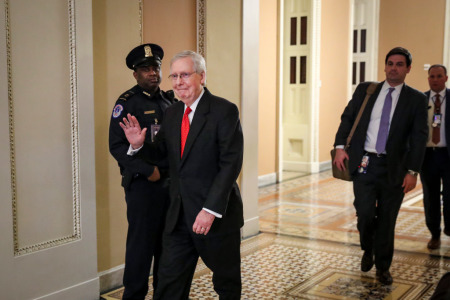Mitch McConnell to step down as top Senate Republican, quotes Ecclesiastes

U.S. Senate Minority Leader Mitch McConnell, R-Ky., says he will step down from his post as the upper chamber's top Republican at the end of the year, quoting from the Old Testament book Ecclesiastes in a speech on the Senate floor Wednesday.
McConnell announced his intention to "move on to life's next chapter," proclaiming, "This will be my last term as Republican leader of the Senate." But he vowed, "I'm not going anywhere anytime soon."
"However, I'll complete my job my colleagues have given me until we select a new leader in November and they take the helm next January," he added. "I'll finish the job the people of Kentucky hired me to do as well, albeit from a different seat."
McConnell, 82, suggests that his age played a role in his decision to step down.
"Father Time remains undefeated," he said. "I'm no longer the young man sitting in the back, hoping colleagues would remember my name. It's time for the next generation of leadership."
"I'm immensely proud of the accomplishments I've played some role in attaining for the American people," he said. "There are many challenges we must meet to deliver for the American people and each will have my full effort and attention. I still have enough gas in my tank to thoroughly disappoint my critics, and I intend to do so with all the enthusiasm with which they've become accustomed."
McConnell thanked his colleagues for "entrusting me with our success," adding, "It's been an honor to work with each of you."
He quoted from Ecclesiastes, declaring, "To everything there is a season and a time to every purpose under Heaven." He assured his fellow senators, "It's time for me to think about another season."
Following his remarks, McConnell was embraced by his colleagues on both sides of the aisle. McConnell is the longest-serving Senate leader in U.S. history as well as the longest-serving senator in the history of Kentucky.
McConnell was first elected to the U.S. Senate in 1984 and has served as the chamber's top Republican since 2007. He served as Senate minority leader from 2007-2015 and as Senate majority leader from 2015-2021. He became Senate minority leader again in 2021 after Democrats retook control of the U.S. Senate.
Throughout McConnell's tenure as Senate majority leader, he played an important role in filling three vacancies on the U.S. Supreme Court.
Following the death of Republican-appointed Justice Antonin Scalia in February 2016, McConnell decided not to hold confirmation hearings for then-President Barack Obama's pick to replace Scalia, Merrick Garland. Instead, he elected to leave the position vacant so it could be filled by the next president, as the 2016 U.S. presidential election was just months away.
"The next Supreme Court justice could fundamentally alter the direction of the court and our country for a generation, and the American people deserve a voice in such a momentous decision," McConnell wrote in an op-ed explaining his actions. As McConnell's op-ed implied, selecting Garland for Scalia's seat would have moved the ideological balance of the court to the left.
Republican Donald Trump won the 2016 presidential election. Shortly after taking office, he nominated Neil Gorsuch for the Supreme Court seat. When Democrats tried to filibuster Gorsuch, who needed the support of 60 U.S. senators to move ahead with the nomination, McConnell invoked the so-called "nuclear option" to allow Gorsuch to be confirmed with a simple majority vote.
A year and a half later, Trump nominated Brett Kavanaugh to fill the vacancy caused by the retirement of long-serving Republican-appointed Justice Anthony Kennedy. Allegations of sexual assault against Kavanaugh emerged and threatened to derail the nomination. In the days leading up to the final vote on Kavanaugh's confirmation, Republican lawmakers saw their addresses leaked as part of what McConnell denounced as an effort by the "mob" to intimidate senators.
"The mob was not able to intimidate the Senate," McConnell told Fox News' Laura Ingraham following Kavanaugh's confirmation by the U.S. Senate. "We stood up to the mob. We did the right thing for a good man that filled a lifetime appointment on the Supreme Court. There is a lot to celebrate today. I couldn't be prouder of all my members."
Just a month and a half before the 2020 presidential election, liberal Supreme Court Justice Ruth Bader Ginsburg died. Shortly after her death, McConnell vowed that the U.S. Senate would vote on a nominee picked by Trump despite what happened with Garland four years earlier because of what he viewed as a mandate in the form of an expanded Republican Senate majority following the 2018 midterm elections.
The U.S. Senate confirmed Amy Coney Barrett to fill Ginsburg's seat, replacing the reliably liberal justice with a Republican-appointed one. The transformation of the Supreme Court from a 5-4 Republican-appointed majority to a 6-3 Republican-appointed majority under McConnell's watch has had profound implications in American politics. Most notably, the U.S. Supreme Court voted 5-4 to overturn the Roe v. Wade decision that legalized abortion nationwide in June 2022.
Ryan Foley is a reporter for The Christian Post. He can be reached at: [email protected]






















